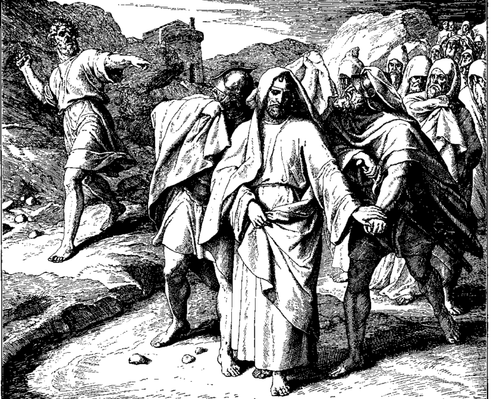2 Samuel 16:5-8
“When King David came to Bahurim, there came out a man of the family of the house of Saul, whose name was Shimei, the son of Gera, and as he came he cursed continually. And he threw stones at David and at all the servants of King David, and all the people and all the mighty men were on his right hand and on his left. And Shimei said as he cursed, ‘Get out, get out, you man of blood, you worthless man! The LORD has avenged on you all the blood of the house of Saul, in whose place you have reigned, and the LORD has given the kingdom into the hand of your son Absalom. See, your evil is on you, for you are a man of blood.’”
Back in the 80s and 90s, Christianity Today ran a monthly column entitled “Shimei’s Dust,” the author of the piece deliciously remaining anonymous. (I think his identity was revealed when the column run ended, but I can’t remember who it was.) The cartoon graphic presented Shimei as the spitting image of the logo guy from the boardgame “Monopoly,” only instead of the black top hat, he was wearing a shepherd’s robe. The column was an occasion for the author to complain about various and sundry fads trending within American Evangelical tribes. I looked forward each month to the column. What will “Shimei” carp about this month? It was quite entertaining and seemed to give voice vicariously to my own thoughts.
However, as you must notice in the passage from Shimei’s debut in the Bible, his demeanor and comportment can’t be spun as curmudgeonly. He’s not clever or constructive in any sense. His game is a rather brutal assault on King David— so much so that David’s nephew, Abishai wanted to take the head off that sorry dog for the propriety-stretching provocation.
But perhaps even more shocking than this assault, is King David’s response to the insult-snipe. A paraphrase might go something like this: “Abishai, put away your sword, fool!” His actual response demonstrates why he is known to us as a man after God’s own heart: “Leave him alone, and let him curse, for the LORD has told him to. It may be that the LORD will look on the wrong done to me, and that the LORD will repay me with good for his cursing today.” (16:11-12). David seems to be channeling Romans 8:28 here! But I think what we are witnessing in this encounter, as well as the entirety of the exilic march across the Kidron Valley and up the Mount of Olives, is a foretaste of the Greater David when he makes this same trek across Kidron, culminating in Gethsemane. Of course, David’s exit is due to his own sins, but the later trail of tears of David’s Son will not be a consequence of his own sin, but the sins of Israel (and the world) he will bear to Gethsemane, ultimately pierced on Calvary.
Robert Barron, in his thoughtful commentary on Davids sorrowful exile, makes this connection: “Christians cannot help but hear an echo of Christ in the narrative of Shimei and the king. As Jesus walked away from Jerusalem the night before he died, following the same path as the retreating David, he entered into a dreadful period during which he would be massively abused by a whole series of Shimeis: his own fearful and denying disciples, the temple guards, the corrupt Sanhedrin, Herod [Antipas], Pilate, the soldiers of the Roman garrison, and the mocking bystanders on Calvary. Having taken upon himself the sins of the world, Jesus became an object of contempt and derision, and, like his ancient prototype, he did nothing to prevent his persecutors from attacking him. In point of fact, he accepted it as the will of his father. In Galatians, Paul interprets the cross of Jesus as the locus of both curse and blessing: ‘Christ redeemed us from the curse of the law by becoming a curse for us… in order that in Christ Jesus the blessing of Abraham might come to the Gentiles’ (Gal. 3:13-14). The curse imposed by God the Father on the suffering Jesus, through the mediation of an army of Shimeis, became the condition for the possibility of a benediction to the human race.” (Robert Barron, Brazos Theological Commentary on the Bible: 2 Samuel, Brazos Press, 2015. p.151).
This comparison is even more obvious at the end of this lesson in chapter 18 when Absalom, by the hand of Joab, is killed in the inevitable clash between king and wanna-be-king. When 2 Samuel 18:8 declares “the forest devoured more people that day than the sword” that becomes literally true, as Absalom is “devoured” by a large oak tree— hanging between heaven and earth. But David’s response is so Christ-like: “O Absalom! If only it had been me, not you!” In other words, “Father, forgive him, he knows not what he does.”
Much here to digest (pun intended). David is restored to the Throne. He will return to Jerusalem to serve out his forty-year reign. Finishing weaker, though the likeness and anticipation of his Greater Son still defines well his fallen, imperfect heart.


